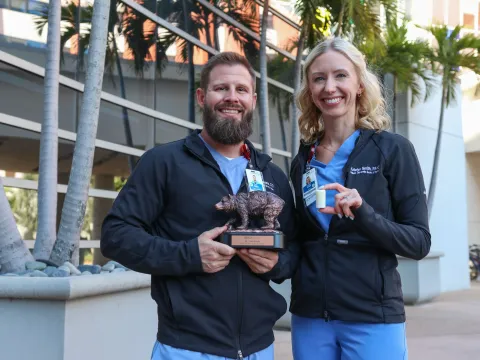- AdventHealth

Choose the health content that’s right for you, and get it delivered right in your inbox.
AdventHealth Cancer Institute Executive Medical Director Dr. Mark Socinski recently published the lead article titled “MET Exon 14 Skipping Mutations in Non-Small-Cell Lung Cancer” in the American Society of Clinical Oncology’s JCO Precision Oncology journal. Socinski and his colleagues discuss the complex genomic events leading to non-small-cell lung cancer (NSCLC) and also review the specific considerations for detecting the MET exon 14 skipping mutation (METex14) using next-generation sequencing genetic testing.
Lung cancer is the second most frequently diagnosed type of cancer and the leading cause of cancer deaths. NSCLC makes up 85% of lung cancer diagnoses in the U.S., and research over the last decade has uncovered numerous molecular mutations that drive the disease. This has led to development of new targeted therapies to improve outcomes.
“In the past 10 years, we have seen a transformation in how we think about lung cancer, especially non-small-cell lung cancer,” explains Socinski. “NSCLC is actually a very generic term that encompasses a number of different types that are driven by varying molecular alterations. Understanding the specific mutation that caused the cancer allows us to treat the patient more effectively with an appropriate targeted therapy.”
The METex14 mutation is one of the newer drivers identified, and it occurs in approximately 3-4% of NSCLC cases. Two new drugs, capmatinib and tepotinib, were recently approved by the Food and Drug Administration (FDA) specifically for metastatic METex14 NSCLC. Socinski’s article explores the biology, clinical outcomes and testing considerations for METex14 to help educate oncologists on this new development and the importance of next-generation sequencing genetic testing to identify and more effectively treat NSCLC patients.
“Comprehensive genomic testing is no longer an option; it should be the standard of care for every non-small-cell lung cancer patient,” says Socinski. “We know that the new generation of targeted therapies available to us can dramatically improve outcomes, so it is imperative that we properly identify the driving mutation.”
A board-certified, fellowship-trained medical oncologist, Socinski is an internationally recognized expert in the development of novel chemotherapy agents and treatment strategies for advanced NSCLC and small-cell lung cancer. Since 2005, his research has focused on incorporating personalized medicine and molecular biomarkers in the treatment of lung cancer, and he has led AdventHealth’s involvement in clinical trials for METex14. Socinski also formerly served as co-chair of the thoracic malignancies steering committee for the National Cancer Institute.
Physicians with questions about this research or a specific NSCLC case, contact an AdventHealth thoracic oncology nurse navigator at:
- Brenda Rzeszutko at Call407-303-2982
- Dashi Haynes at Call407-303-2433
- Jill Cavara at Call407-303-3213
Recent News

While the field of orthopedics has made incredible strides in recent decades, challenges and opportunities remain.
In our latest Clinician’s View, Rothman Orthopaedics Florida at AdventHealth Director...

The AdventHealth Neuroscience Institute is the first in Florida and one of the first in the country to begin recruiting patients with primary progressive or non-active secondary progressive multiple...

Accurately determining food intake remains a challenge in nutrition research. A new study published in Nature Metabolism and co-authored by Dr. Corbin introduces a metagenomics-powered approach to...

Discover what’s being accomplished in Central Florida to bridge the health gap with Orange County Mayor Jerry Demings and AdventHealth’s Dr. Alric Simmonds.

Breakthrough device offers new hope for stroke survivors struggling with rehabilitation following ischemic stroke

Jennifer Seminerio, MD, recently became one of the first in Florida to use intestinal ultrasound (IUS) to help assess and manage treatment of patients with inflammatory bowel disease (IBD). A non...

Every year, approximately 1.5 million surgical heart procedures require access to the left side of the heart for catheter-based treatments like atrial fibrillation (AF) ablation, left atrial appendage...

The Convergent Hybrid Ablation procedure has been gaining acceptance as an effective treatment option for long-standing persistent atrial fibrillation (AFib) since the CONVERGE trial data published in...

Recently, AdventHealth for Children pediatric orthopedic surgeon Sean Keyes, DO, Katelyn Smith, PA-C, and their team performed their 100th bridge-enhanced anterior cruciate ligament (ACL) repair (BEAR...

To help bridge the gap and save more lives, AdventHealth and OurLegacy, east Central Florida’s federally designated organ procurement organization (OPO), recently opened an innovative, centralized and...

Through his leadership in The Society for Healthcare Epidemiology of America (SHEA), AdventHealth Healthcare Epidemiologist and Infection Control Officer Vincent Hsu, MD, MPH, FSHEA, FACP, has been...

Physician leaders from AdventHealth’s emergency department, infectious disease, inpatient, pediatrics and pharmacy teams all collaborated to develop a respiratory virus testing algorithm to assist...
